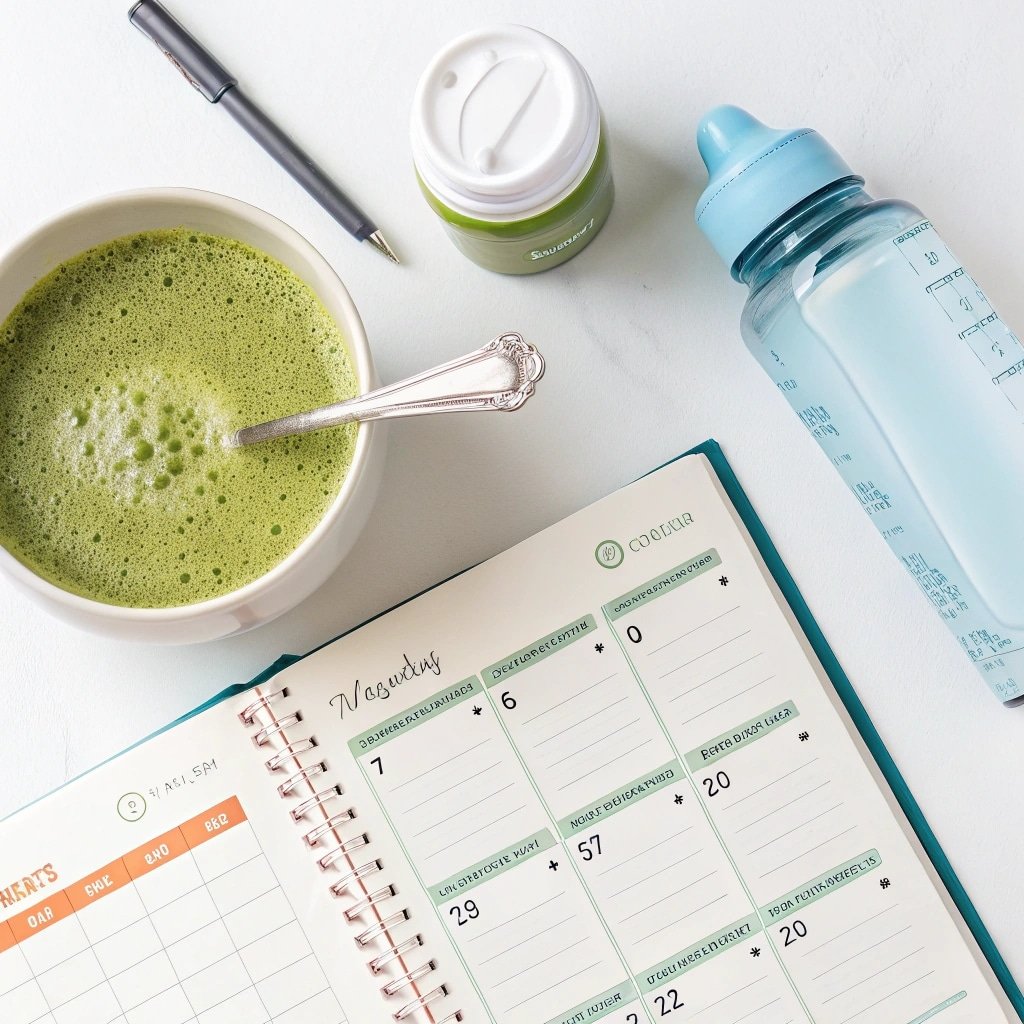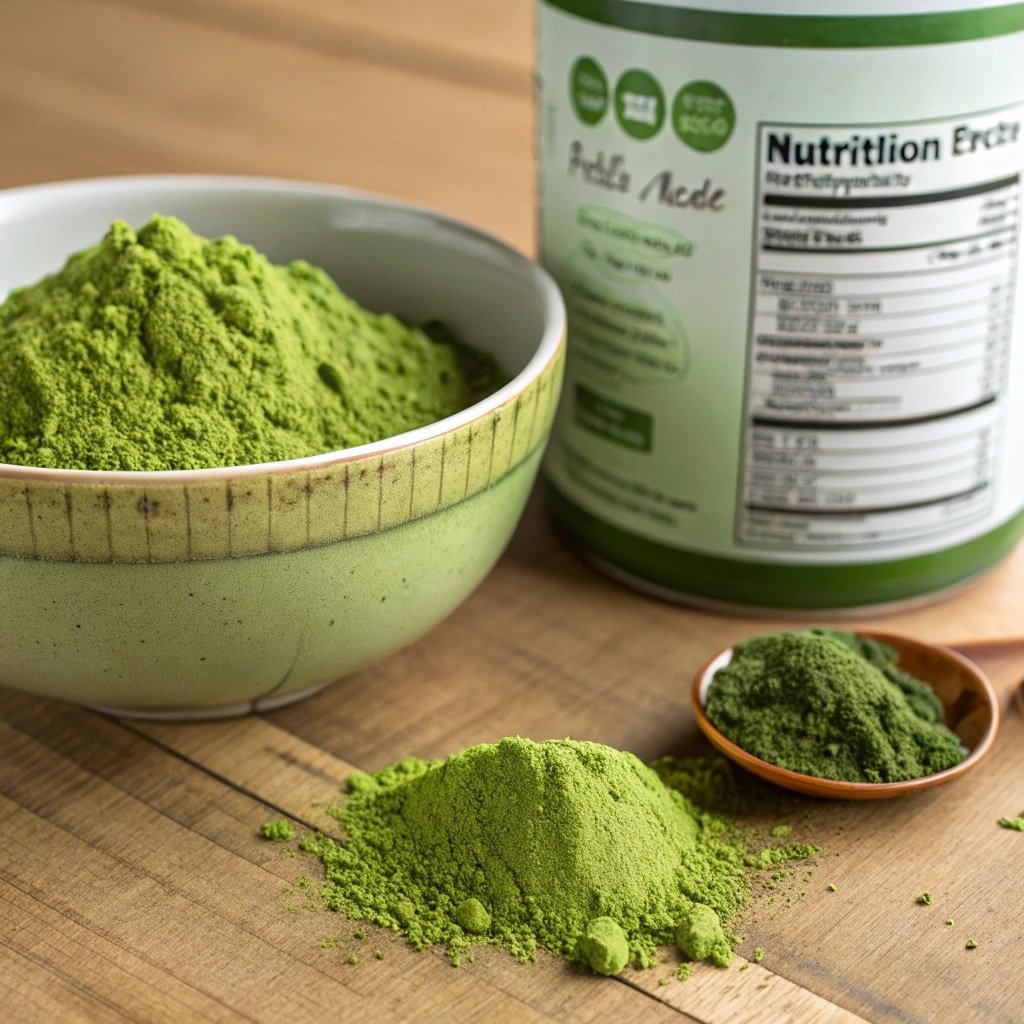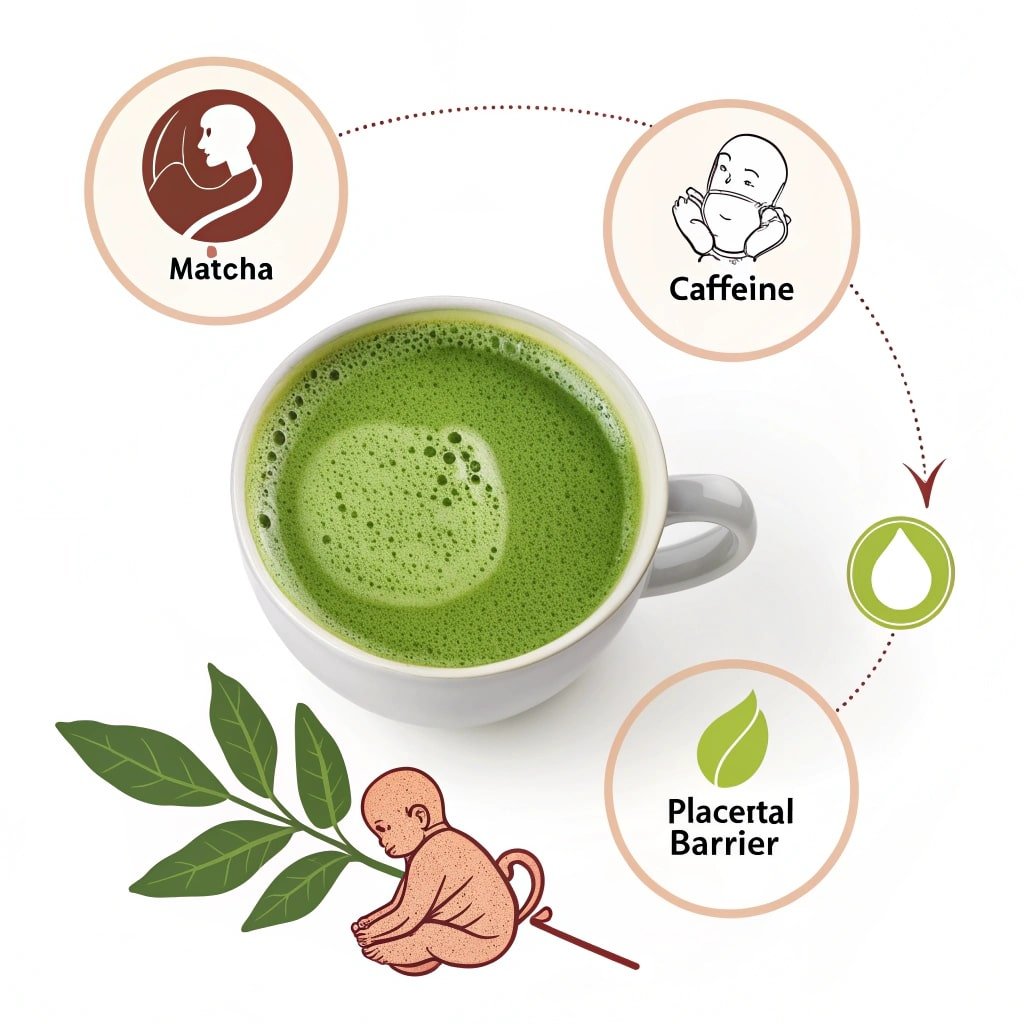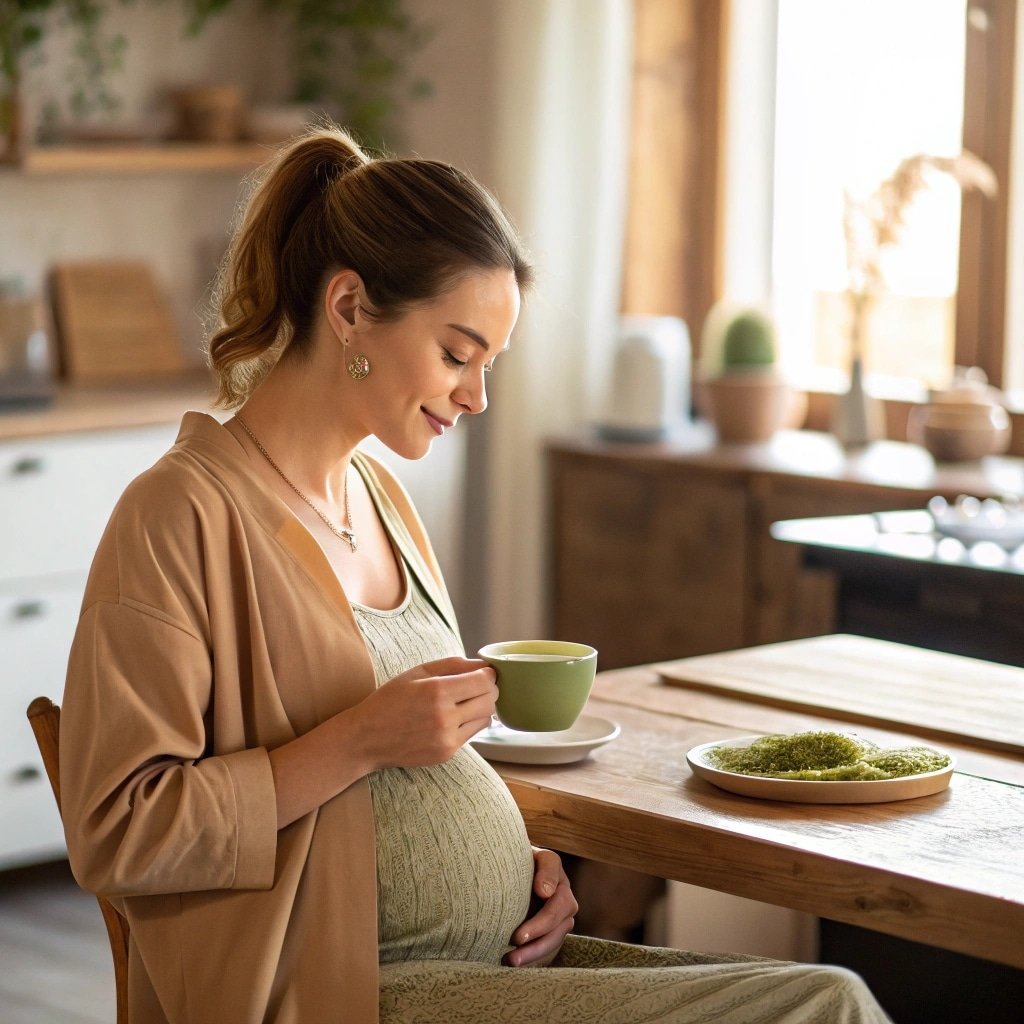Pregnancy and matcha green tea—two things that don’t often appear together, but absolutely should.If you’re pregnant and enjoy drinking matcha, you might be asking yourself: Is it safe to keep having it? How much is too much? Could it affect your baby? These questions are not only common but incredibly important. In this guide, we’ll explore matcha’s nutritional value, its risks and benefits during pregnancy, its effect on folic acid, and the facts about matcha crossing the placenta. You’ll walk away with confidence in your choices—because motherhood and mindfulness go hand in hand.
Table of Contents
Pregnancy and Matcha Green Tea – A Personal and Nutritional Look
When I faced the matcha question while expecting
Pregnancy and matcha green tea became a personal research mission for me when I found out I was expecting. I had always started my mornings with a frothy, calming bowl of matcha. But pregnancy changed everything. Suddenly, I was asking questions like: Does this harm my baby? Can I still drink this without worry? I wasn’t alone. Thousands of expecting moms want clarity on whether they need to part ways with this vibrant green drink—or if it can safely remain a part of their routine.
The Benefits of Matcha—and Why It’s More Than Just Your Average Tea
Unlike regular steeped tea, matcha is made from ground whole green tea leaves, which makes it a concentrated source of both good and risky compounds. It’s high in antioxidants, especially EGCG, which may offer benefits like supporting immunity and lowering inflammation. But it also contains caffeine—about 35 to 70 mg per serving. While pregnant, it’s best to limit your daily caffeine intake to under 200 mg. Matcha can still be part of your routine, as long as it’s consumed in moderation. However, another concern is its potential to block folic acid absorption, especially if consumed in large amounts. Since folic acid is crucial during the first trimester, this becomes an important factor to weigh.
Drinking matcha while pregnant isn’t off-limits. It’s about balance, timing, and knowing what you’re consuming. As I’ll explain in the next sections, not all matcha is created equal—and how you drink it matters just as much as how often.
Matcha’s Nutrients and the Real Needs of Pregnancy
Why pregnancy and matcha green tea are a tricky nutritional match
When considering pregnancy and matcha green tea, it’s tempting to focus only on the benefits. Matcha contains a rich supply of antioxidants, especially EGCG, which may help reduce inflammation and support immune health. It’s also a source of L-theanine, known for promoting calm and focus—something every expecting mom could use. However, during pregnancy, your nutritional priorities shift. You need folic acid to protect against neural tube defects, iron to support increased blood volume, and calcium to strengthen bones—for both you and your baby.
Here’s the catch: matcha’s catechins can interfere with the body’s absorption of folic acid if consumed in excess. That’s why understanding the relationship between pregnancy and matcha green tea is so important. One solution is to avoid drinking matcha around the time you take your prenatal vitamin or consume folate-rich foods. This small shift can help you enjoy matcha without compromising nutrient absorption.


How much matcha is safe in pregnancy?
Caffeine is another key issue when we talk about pregnancy and matcha green tea. Matcha contains more caffeine than regular green tea because it’s made from the entire tea leaf. A typical serving can range from 35 to 70 mg of caffeine. Since most experts recommend a caffeine limit of 200 mg per day during pregnancy, one small matcha latte is usually fine. The key is moderation and consistency.
If you’re looking for comfort without worry, keep your serving around ½ teaspoon daily. That allows you to benefit from matcha’s nutrients without pushing past your caffeine limit. Understanding pregnancy and matcha green tea from both sides—benefit and caution—helps you make mindful choices every day.
Real Concerns About Pregnancy and Matcha Green Tea
Does matcha affect folic acid or cross the placenta?
When evaluating pregnancy and matcha green tea, one of the most common concerns is whether its compounds cross the placenta or impact folic acid absorption. Matcha contains catechins—specifically EGCG—which can potentially reduce how well the body absorbs folic acid. Since folic acid is essential in the first trimester for preventing neural tube defects, this is something pregnant women shouldn’t ignore.
To stay safe, avoid drinking matcha within one hour before or after taking prenatal vitamins or folate-rich meals. Timing matters more than total restriction. Regarding placental transfer, caffeine and some catechins can cross the placenta, but at moderate levels—like those in a ½ teaspoon matcha drink—the risk is low. What matters most is your total daily caffeine intake and spacing matcha properly with nutrients.
Is matcha safe for the baby?
The safety of pregnancy and matcha green tea also raises questions about the baby’s development. Matcha is not directly harmful, but it does contain caffeine and trace amounts of lead due to how tea plants absorb minerals from the soil. While lead levels are usually minimal, pregnant women are more vulnerable to toxic exposure. Choosing high-quality, organic Japanese matcha (which typically tests lower in heavy metals) is crucial during pregnancy.
Additionally, consuming matcha in controlled amounts—no more than one cup a day—helps minimize any risk. If you’re consuming matcha daily, opt for ceremonial-grade tea from reputable brands that test for purity. That ensures your pregnancy and matcha green tea experience is not only comforting but also cautious and safe for your growing baby.

How to Enjoy Pregnancy and Matcha Green Tea Safely
Best practices for drinking matcha while pregnant
Navigating pregnancy and matcha green tea doesn’t mean giving it up—it means adjusting how and when you enjoy it. The key is moderation and mindfulness. Stick to one small serving per day, ideally using ½ teaspoon of high-quality ceremonial-grade matcha. This keeps caffeine levels low (about 30–35 mg) and avoids overwhelming your system. Also, try not to drink matcha on an empty stomach, especially during the first trimester, when nausea is more common.
To protect folic acid absorption, avoid consuming matcha within an hour of taking prenatal supplements or eating folate-rich meals. Timing makes a real difference. And if you’re blending matcha with milk or oat milk, it can also help slow caffeine absorption, creating a smoother energy boost without the jitters.
Choose high-quality matcha and rotate your intake
When it comes to pregnancy and matcha green tea, quality is everything. Matcha grown in Japan—especially from regions like Uji or Nishio—is known for lower contamination levels and higher purity. Look for brands that test for lead, pesticides, and heavy metals, and avoid matcha blends with additives or flavorings. Organic, lab-tested ceremonial-grade matcha is your best friend.
Also, consider alternating days or taking breaks if you drink matcha often. That gives your body room to adjust, especially in later trimesters when sensitivity increases. Drinking plenty of water alongside your matcha can also help your body process it more gently. When enjoyed carefully, pregnancy and matcha green tea can absolutely coexist—bringing you comfort, antioxidants, and a small daily ritual to savor.
Conclusion: Can You Enjoy Matcha While Pregnant? Absolutely—With Care
Pregnancy and matcha green tea can absolutely go hand in hand, as long as you’re mindful of how much, when, and what kind you’re drinking. From caffeine content to folic acid interaction, understanding these factors lets you enjoy your daily ritual safely. Choose top-grade matcha, time it well with meals and supplements, and always stay within the recommended caffeine limits. Being informed empowers you to enjoy comfort and connection, even during pregnancy—one sip at a time.
For More recipes Follow me in Facebook and Pinterest
FAQs About Pregnancy and Matcha Green Tea
Does matcha cross the placenta?
Yes, some compounds in matcha—especially caffeine and catechins—can cross the placenta. However, when consumed in moderation—about ½ to 1 teaspoon per day—the levels are low and generally not harmful. It’s important to track your overall daily caffeine intake and choose high-quality matcha to minimize any risks during pregnancy.
Does matcha block folic acid?
Matcha contains catechins that may interfere with folic acid absorption if consumed close to meals or supplements. Since folic acid is crucial during early pregnancy, it’s best to drink matcha at least one hour before or after taking your prenatal vitamin or eating folate-rich foods.
Is there any side effect of green tea on pregnancy?
Green tea, including matcha, may cause mild side effects like nausea or caffeine sensitivity in some pregnant women, especially when consumed on an empty stomach. High intake may reduce folic acid absorption and increase caffeine exposure. Moderation and timing are key to avoiding these effects.
Is matcha safe for babies?
Matcha is not recommended for infants or young children due to its caffeine content and potential heavy metal exposure. During pregnancy, small amounts of matcha are generally safe for the developing baby, provided it’s consumed responsibly and is lab-tested for contaminants.

